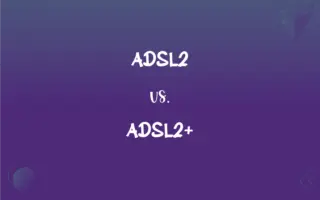Informed Search vs. Uninformed Search: What's the Difference?
By Janet White || Published on February 15, 2024
Informed search uses additional knowledge for decision-making, whereas uninformed search explores options without external insights.

Key Differences
Informed search involves algorithms that utilize additional knowledge or data to guide their process, making them generally more efficient. Uninformed search, in contrast, operates without any extra information, relying solely on the problem's structure, which can lead to less efficiency and longer search times.
Uninformed search algorithms, such as Breadth-First and Depth-First search, systematically explore the search space without any direction. Informed search, like A* or Greedy algorithms, use heuristics to estimate the best path, reducing the search space and time.
Informed search strategies are beneficial when specific knowledge about the problem domain is available, which can be exploited to find solutions more effectively. Uninformed search strategies, while more general-purpose, may waste resources exploring irrelevant paths or options.
In uninformed search, each choice is made with equal preference, as it lacks additional information to prioritize options. In contrast, informed search algorithms prioritize choices based on additional, problem-specific information or heuristics, leading to a more focused search.
Informed search methods are particularly useful in complex or large search spaces where efficiency is crucial. Uninformed search methods, while simpler and easier to implement, may become impractical in such scenarios due to their exhaustive and often blind exploration.
ADVERTISEMENT
Comparison Chart
Knowledge Utilization
Uses external knowledge or heuristics
Lacks external knowledge, purely algorithmic
Efficiency
Generally more efficient in large search spaces
Less efficient, especially in large or complex spaces
Example Algorithms
A*, Greedy Best-First Search
Breadth-First Search, Depth-First Search
Problem Suitability
Ideal for problems with known characteristics or patterns
Suitable for problems with unknown or undefined characteristics
Decision Making
Decisions based on heuristics or additional data
Decisions made without preference or guidance
ADVERTISEMENT
Informed Search and Uninformed Search Definitions
Informed Search
Informed search applies domain-specific insights to direct its algorithm.
In chess, an informed search evaluates future moves based on possible outcomes.
Uninformed Search
Uninformed search explores options systematically without external insights.
Traversing a maze blindly is akin to an uninformed search.
Informed Search
Informed search is a method where extra information influences decision-making.
In web search, informed search uses previous queries to refine results.
Uninformed Search
It's a search method operating solely on the problem's structure.
A robot vacuum cleaning in a random pattern employs uninformed search.
Informed Search
Informed search employs heuristics to guide the search process.
In a maze, an informed search might use distance to the end point as a guide.
Uninformed Search
This search strategy treats all options equally, lacking heuristics.
Choosing a random book from a library shelf is an uninformed search.
Informed Search
It's a search strategy that uses problem-specific heuristics to enhance efficiency.
For route optimization, informed search considers road conditions and shortcuts.
Uninformed Search
Uninformed search conducts exhaustive search without prioritizing options.
Flipping through TV channels randomly is an example of uninformed search.
Informed Search
An informed search utilizes additional knowledge for efficient problem-solving.
When finding the shortest path in a city, informed search considers traffic patterns.
Uninformed Search
Uninformed search makes no use of domain-specific knowledge.
Solving a puzzle without any clues is an uninformed search.
FAQs
Can informed search be applied to any problem?
It's most effective in problems where relevant additional knowledge or heuristics are available.
Is uninformed search less efficient than informed search?
Generally, yes, especially in complex or large search spaces.
Does informed search guarantee a better solution?
It doesn't guarantee a better solution, but it often finds solutions more efficiently.
Is uninformed search easier to implement?
Yes, it's generally simpler and more straightforward to implement.
What are examples of informed search algorithms?
Examples include A* and Greedy Best-First Search.
Are informed searches always accurate?
Not always, as their accuracy depends on the relevance and quality of the used heuristics.
Why choose uninformed search in some cases?
It's chosen for its simplicity and when domain-specific knowledge is lacking.
What is informed search?
Informed search uses additional knowledge or heuristics to guide the search.
Can uninformed search be exhaustive?
Yes, it can be exhaustive, exploring all possible options.
How does uninformed search work?
Uninformed search systematically explores options based solely on the problem's structure.
Do informed searches require more computational resources?
They can, depending on the complexity of the heuristics used.
Can informed search strategies be combined?
Yes, they can be combined for more sophisticated search strategies.
Is it true that uninformed searches are blind searches?
Yes, they are often referred to as blind searches as they lack directional insight.
What role do heuristics play in informed search?
Heuristics guide the search towards more promising areas, enhancing efficiency.
Can uninformed search be effective in unknown environments?
Yes, especially in environments where no additional knowledge is available.
What are common uninformed search methods?
Breadth-First Search and Depth-First Search are common examples.
Can informed search reduce search time?
Yes, by using heuristics, it often reduces the time needed to find a solution.
Are uninformed searches always slower?
Not always, but they tend to be slower in larger or more complex search spaces.
Is uninformed search suitable for all problems?
It's suitable for simpler or well-defined problems but may struggle with complex ones.
What kind of knowledge does informed search use?
It uses domain-specific knowledge or problem-relevant heuristics.
About Author
Written by
Janet WhiteJanet White has been an esteemed writer and blogger for Difference Wiki. Holding a Master's degree in Science and Medical Journalism from the prestigious Boston University, she has consistently demonstrated her expertise and passion for her field. When she's not immersed in her work, Janet relishes her time exercising, delving into a good book, and cherishing moments with friends and family.































































